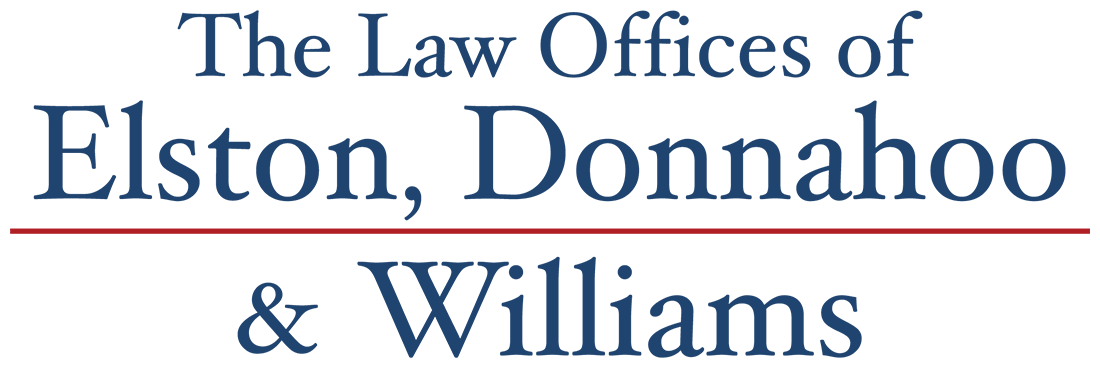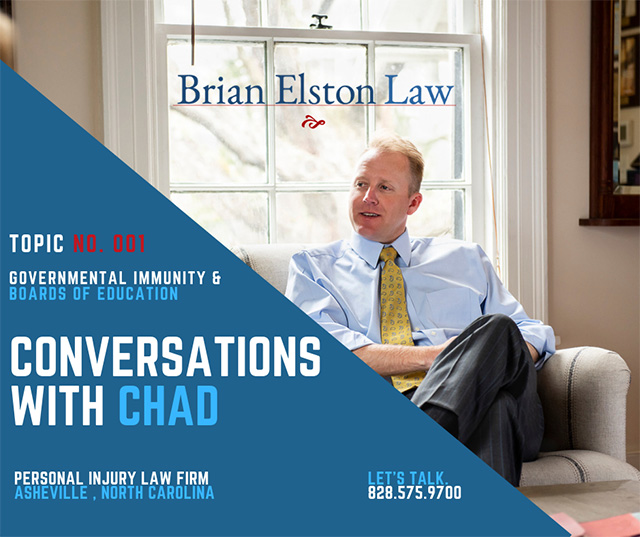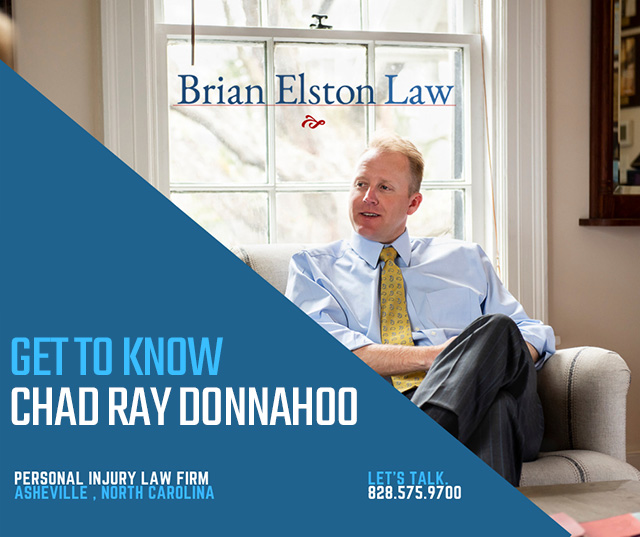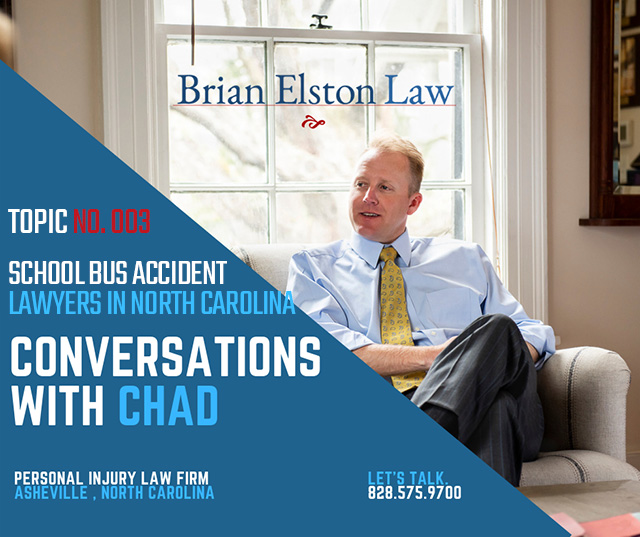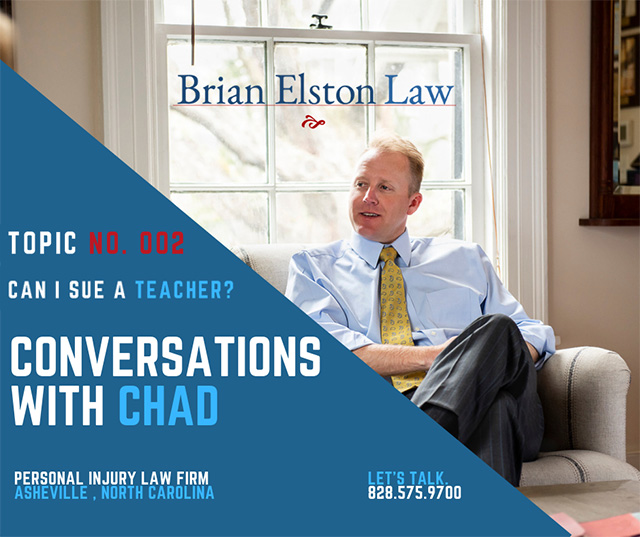TOPIC NO. 001
GOVERNMENTAL IMMUNITY & BOARDS OF EDUCATION
CONVERSATIONS WITH CHAD
GOVERNMENTAL IMMUNITY &
BOARDS OF EDUCATION
By CHAD DONNAHOO
This “Conversations with Chad” deals with how governmental immunity impacts suing a board of education. As anyone who has ever stood in line at the DMV for two hours can tell you, most anything involving the government is never easy. Trying to get a governmental entity to give you money to compensate you for its wrongdoing is particularly challenging.
01
“The king can do
no wrong”
This old doctrine dates back many centuries ago to England and stands for the premise that
even if he did something wrong, the king should not have to pay money judgements to compensate his subjects. Obviously, North Carolina isn’t a kingdom and the Governor isn’t a king; however, this old English doctrine, known as “governmental immunity”, is still alive and well in our State.
PERSONAL INJURY LAW FIRM
ASHEVILLE , NORTH CAROLINA
LET’S TALK.
828.575.9700
When analyzing a potential legal claim against a board of education, there are several things to consider.
No. 1 Governmental Immunity.
Generally, when boards of education are engaged in governmental functions,
they are entitled to governmental immunity for tort and negligence-based actions. Governmental immunity does not apply if: a) the board of education is engaged in a proprietary function (i.e., performing a function not historically provided by the government that could be provided by a private business or corporation); b) for breach of contract claims; or c) for violations of state/federal constitutional claims.If a board of education is engaged in a governmental function (a likely event for most school systems) and the board of education has not otherwise waived its government immunity, it will not liable for tort or negligence-based actions.
No. 2 Waiving Government Immunity.
A board of education waives its governmental immunity for tort and negligence-based actions when it procures insurance through a company or corporation licensed and authorized to issue insurance in North Carolina. Governmental immunity is waived up to the amount of insurance purchased and only for those things covered by the insurance policy. For example, if the board of education’s insurance policy limit is one million dollars, a plaintiff will only be entitled to collect up to the policy limit. The board of education retains its governmental immunity for damages in excess of the policy limit.
A minority of boards of education across of North Carolina, particularly in larger, urban districts, have waived their governmental immunity through the purchase of commercial insurance.
No. 3 The North Carolina School Boards Trust.
Most boards of education in North Carolina are members of the North Carolina School Boards Trust (“Trust”). Understanding what the Trust covers can be complicated. Essentially, the Trust operates like a risk pool and participation in the Trust is not considered the purchase of insurance and does not waive governmental immunity.
The Trust itself provides $150,000 in “coverage” for each member-board of education. Remember, however, that this “coverage” is not insurance and the board of education has not waived its governmental immunity. This “coverage” is mostly for issues that do not pertain to claims subject to governmental immunity (i.e., employment claims, breach of contract, proprietary functions, etc.). In a garden-variety negligence case, if a student is injured and the student’s forecast of damages is below $150,000, the board of education retains its governmental immunity and is not liable for anything.
As a member of the Trust risk management program, however, member-boards of education also purchase excess insurance up to $850,000. The excess insurance is commercial insurance and is a waiver of governmental immunity. The easiest way to explain this is through the following hypotheticals:
Hypothetical #1. During recess, John, a six-year old student, is injured on the school playground. It is undisputed that John’s teacher failed to provide adequate supervision while he was on the playground. Through respondeat superior, the board of education is sued for negligent supervision and at trial, John is awarded a judgment in the amount of $275,000. Because the board of education is a member of the Trust, John’s recovery is limited, however, to $125,000. Remember, the board of education has retained its
governmental immunity for the first $150,000. The board of education’s liability for damages does not begin until the judgment triggers the excess insurance policy.
Hypothetical #2. Same facts as Hypothetical #1 except John has much more severe injuries and at trial, wins a judgment in the amount of $1,500,000. John’s recovery will be limited to $850,000. He is not entitled to the first $150,000. He is entitled to the full amount of excess insurance; however, once the damages exceed the excess insurance policy limit, the board of education retains its immunity because it no longer has insurance.
Based on how the Trust operates, it is not unusual for the board of education to file a motion for partial summary judgment for the first $150,000 of any potential recovery based on governmental immunity. It is important to carefully explain this concept to clients to manage their expectations. Depending on whether the board of education has insurance or is a member of the Trust can be a critical distinction in a damages analysis. An identical claim might be worth $300,000 in one school district but only $150,000 in a neighboring school district.
No. 4 Limited Claims Settlement.
In their respective policy manuals, almost all boards of education have policies dealing with limited claim settlements for lawsuits. This is especially true for boards of education that use the Trust. While boards of education will occasionally voluntarily waive their governmental immunity to settle cases, it is not a common practice and generally reserved for small claims. In order not to run afoul of the Fourteenth Amendment and the Equal Protection Clause, boards of education must make specific findings for each case in which it voluntarily waives its governmental immunity to settle a claim.
No.5 Statutory Immunity.
Under NCGS 115C-524, boards of education can enter into agreements allowing non-school groups the right to use the school system’s real and personal property (e.g., an AAU
basketball league can use the school gym for a weekend basketball tournament). If the board of education follows its internal rules and regulations and enters into an agreement with the non-school entity, no liability shall attach to the board of education for personal injury suffered by reason of such use.
Whether you like it or not, with respect to boards of education, governmental immunity is the current law of the land. Understanding what the law is and how it works in practice is critical when analyzing lawsuits against boards of education.
